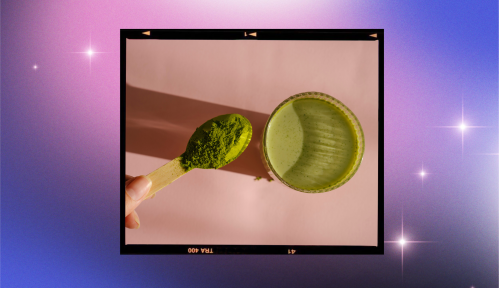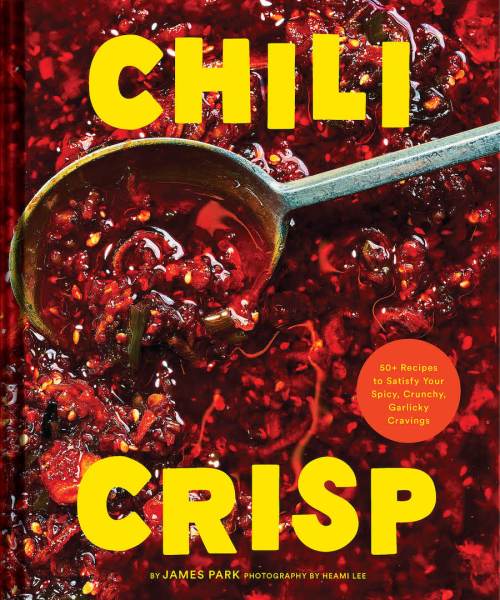Our editors independently select these products. Making a purchase through our links may earn Well+Good a commission
These Incredibly Easy Chili Crisp Recipes Are Rich in Anti-Inflammatory Perks (Plus All the Spice)
Discover two delicious chili crisp recipes from Korean food writer James Park’s new cookbook, Chili Crisp.
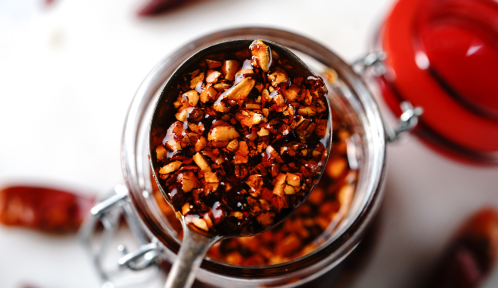
According to Korean food writer James Park (you may know him as Jamesy on social media), one of the easiest ways to turn a dish from drab to fab is by adding a heaping tablespoon of chili crisp. And, frankly, he’s not wrong: The fiery and crunchy topping pairs perfectly with just about anything. Think: eggs (Park’s viral chili crisp fried eggs video has over 3.2 million views on Instagram), greens, sandwiches, tinned fish, all types of rice and grains and pastas and spoons…you get it.
Experts in This Article
food writer and author of Chili Crisp
Great news? Park’s recently-debuted cookbook, Chili Crisp, is fully dedicated to mastering the art of making chili crisp, which includes more than 50 ways to cook with it. And we’ve got you covered until you can get your hands on a hardcopy (run, don’t walk!) because Park shared two of his all-time favorite recipes from the book—garlicky onion crunch and spicy, lemon charred broccolini with jammy eggs—to get a taste of how good (and versatile) chili crisp really is, plus a few tips on chili crisping 101.
Chili Crisp: 50+ Recipes to Satisfy Your Spicy, Crunchy, Garlicky Cravings — $23.00
Why chili crisp is easily one of our all-time favorite condiments
Chili crisp is a beloved blend that combines three essential components—chili flakes, oil, and crunch—to achieve a well-balanced, hot and crispy condiment to add to your every dish (yes, even dessert).
It’s important to note that chili crisp is far from new. Its roots in Sichuan, China date back to just the 1980s (and most likely sooner), but it wasn’t until the late 1990s that it really began to gain mass popularity in East Asia. Today, chili crisp continues to be the hottest (pun intended) condiment folks can’t stop raving about in many parts of the world—U.S. (hi, my kitchen, it’s me!) included.
Aside from its 10 out of 10 flavor factor, chilis—a main component of *chili* crisp—are widely known for their anti-inflammatory benefits. This is because chilis contains capsaicin, a powerful anti-inflammatory compound linked to boosting vascular and metabolic health; some findings suggest that it may also have anti-carcinogenic properties. Lots of flavor and heart-healthy benefits… we love.
So, now that we’re all riding the chili crisp bandwagon, how can we master making and cooking with it? Here’s a little excerpt from the book:
Essential chili crisp 101 tips to know, according to the expert
What are the main ingredients of chili crisp? The main ingredients of chili crisp are a variety of chili flakes, seasonings, additional crispy ingredients, and oil. There are infinite possibilities of flavors and tastes because of these big umbrella categories. Even among chili flakes alone, there are hundreds of different types from different cultures, beyond just Chinese Sichuan chili flakes, one of the most commonly used for chili crisp. Other common ingredients include fermented black beans, fried garlic, fermented soybeans, and other delicious sources of umami.
“There are infinite ways to use chili crisp. The most basic uses include drizzling it over dumplings, noodles, pizza, pasta, and honestly anything you like to eat, including snacks like Doritos! Chocolate chips? Popcorn? Go wild!”
Do all chili crisps taste similar? Absolutely not! That’s like saying all hot sauces taste the same, or that all kimchi tastes the same! Depending on what types of chili flakes, oil, seasonings, and additional ingredients are used, chili crisps can taste wildly different from each other. Some might be super mild, while others may be oilier, crunchier, spicier, and so on. The exciting options and wide range of flavors and textures of chili crisp are the reasons why I highly encourage you to try many different types to find your favorite and build your perfect chili crisp collection.
What’s the difference between chili oil and chili crisp? The key differences between chili oil and chili crisp are the components and the oil-to-crisp ratio; the terms are not necessarily interchangeable. Chili crisp has chili oil, but chili oil doesn’t have chili crisp (i.e. the deliciously crunchy combo of chili flakes, fried garlic, fermented black beans, and so on). You should be able to taste and see the crisp textures. In contrast, chili oil’s simply chili-infused oil—olive oil or canola oil, generally steeped with some spices. There are often few (if any) visible flavoring agents.
How do I store it? Depending on the type of chili crisp you’re working with, you will have to refrigerate it or keep it in the pantry. I keep all my chili crisp in the fridge, even those that don’t specifically call for refrigeration. I think the flavors keep longer in the fridge, but many varieties don’t require refrigeration. For my Everyday Savory Chili Crisp, I recommend storing it in the fridge because there are cooked green onions and garlic.
How do I use it? There are infinite ways to use chili crisp. The most basic uses include drizzling it over dumplings, noodles, pizza, pasta, and honestly anything you like to eat, including snacks like Doritos! Chocolate chips? Popcorn? Go wild! My main message: Whether you are a big chili crisp fan who has gone through countless jars or you have never heard of chili crisp until now, I want to shift the way we use and think of chili crisp.
And, finally, the moment we’ve all been waiting for… two delicious recipes from the book that live up to the full glory that is chili crisp.
2 fiery chili crisp recipes
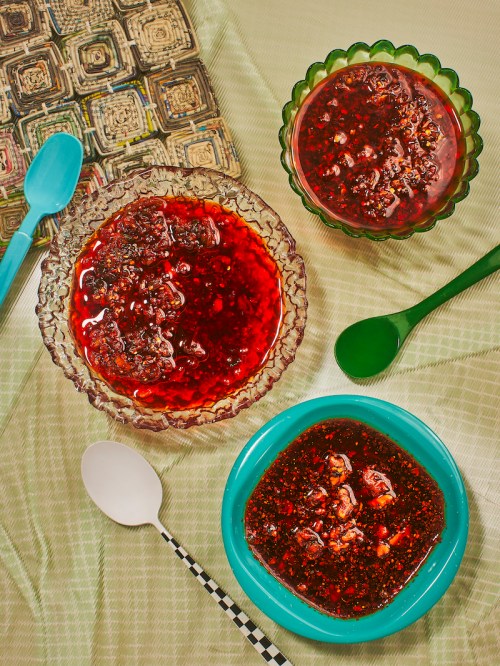
Garlicky onion crunch
Yields 1 1/2 cups
Ingredients1 cup (240 ml) olive oil1/2 cup (55 g) dehydrated minced onion1/4 cup (40 g) minced garlic2 to 3 Tbsp red pepper flakes2 Tbsp Aleppo pepper flakes1 Tbsp soy sauce1 Tbsp smoked paprika1 Tbsp kosher salt
1. In a deep skillet or saucepan over low heat, add the olive oil, dehydrated minced onion, and minced garlic. Heat for 6 to 8 minutes, or until the onion and garlic get toasty and brown.
2. Add the red pepper flakes and Aleppo pepper flakes and cook for about 1 minute, stirring constantly.
3. Transfer the mixture to a heatproof bowl. Add the soy sauce, paprika, and salt and stir to combine. Let it cool for 5 to 10 minutes before transferring it to an airtight container and store for up to 3 months.
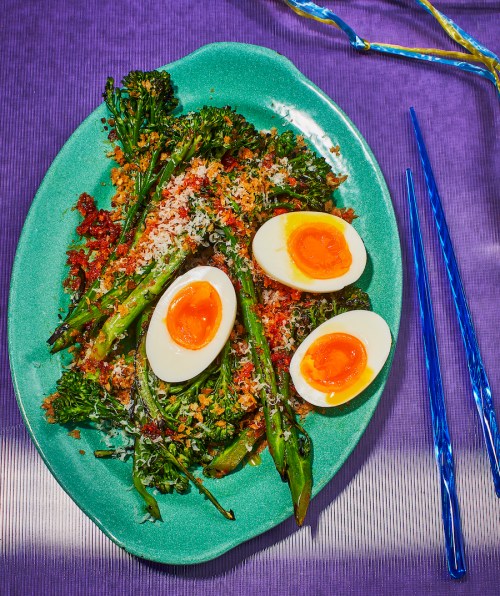
Spicy, lemony charred broccolini with jammy eggs
Yields 1 to 2 servings
Ingredients3 large eggs4 Tbsp (60 ml) extra-virgin olive oil1/2 cup (30 g) panko1 lemon4 Tbsp (60 g) chili crisp1 lb (455 g) broccolini, trimmedGrated Parmesan cheese, for garnish
1. Bring a large pot of water to a boil, add the eggs, and cook for 6 1/2 minutes. Fill a bowl with ice and water. Once the eggs are done, immediately transfer them to the ice-cold water to shock and stop the cooking. Keep them in cold water for 10 minutes while preparing the rest of the dish.
2. In a medium cast-iron skillet over medium-high heat, add 1 Tbsp of the olive oil and the panko. Lightly fry the bread crumbs until they turn golden brown, 3 to 5 minutes. Zest the lemon and reserve the zest. Cut the lemon in half. Save one half for garnish and squeeze the other half (roughly 2 Tbsp juice) over the bread crumbs and stir to combine. The lemon juice might initially make the bread crumbs soggy, but continue to cook for 30 to 60 seconds, or until they are crispy and no longer clumpy.
3. Transfer the bread crumbs to a medium bowl. Add the reserved lemon zest (about 1 tsp) and 2 Tbsp of the chili crisp. Mix to combine and set aside.
4. Halve any thick broccolini stems. Toss them with the remaining 3 Tbsp of olive oil.
5. Reheat the skillet over high heat for at least 2 minutes, or until smoking hot. Working in batches, add the broccolini to the hot pan and cook for 2 minutes, undisturbed, to get a nice char. Flip and cook for another 1 to 2 minutes, depending on how charred and crispy you want them. Turn frequently after the initial charring process to evenly cook. The color of the broccolini should be darker green when it’s done. Turn the heat to low, add the remaining chili crisp, and toss the seasoning with the charred vegetables.
6. When ready to assemble, peel the eggs. Arrange the charred vegetables on a serving platter and sprinkle with the bread crumbs. Halve the jammy eggs and place them around the platter. Squeeze the remaining lemon half over the broccolini, and finish the dish with showers of freshly grated Parmesan cheese. The leftovers can be stored in an airtight container in the fridge for up to 4 days.


